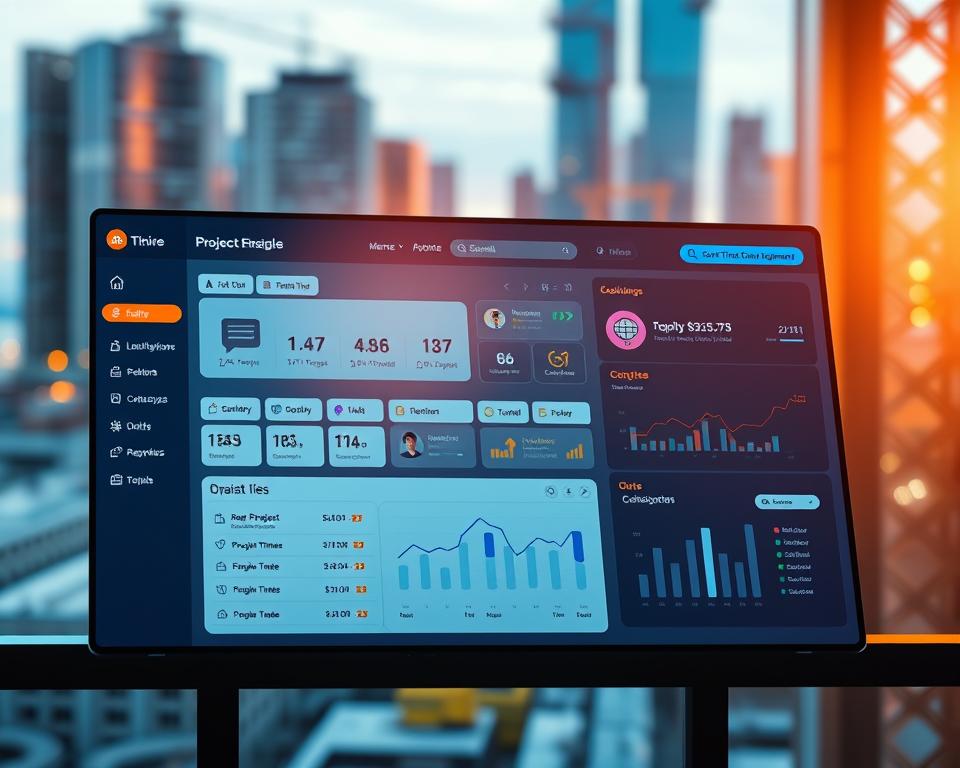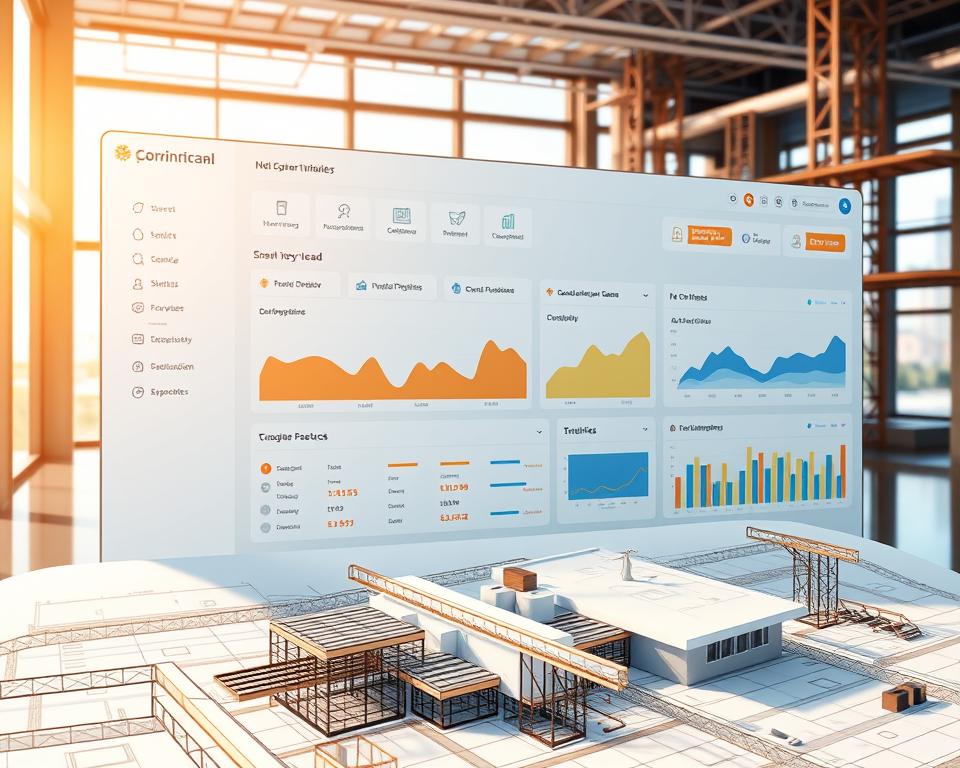Construction management software is key for the construction world. It helps teams work together better and manage projects well. Creating a construction app like Procore can make teamwork better, work more efficient, and manage projects well. For more on building a construction app, check out construction app development complete guide for great tips.
Construction management software and app development are vital for today’s construction projects. These technologies help construction companies work better, save money, and get better results.
Table of Contents
Key Takeaways
- Construction management software is essential for efficient project management
- Developing a construction app like Procore can enhance collaboration and productivity
- Construction app development requires careful planning and execution
- Construction management software can help reduce costs and improve project outcomes
- Effective construction app development involves understanding the needs of construction teams
Understanding the Construction Management App Market
The construction management app market is growing fast. There’s a big need for construction project management tools. Building management apps are becoming key, offering many features to help manage projects.
Big names like Procore, PlanGrid, and Buildertrend lead the market. They provide tools for managing projects, collaborating, and automating workflows. New players are also entering, bringing fresh ideas to the table.
- More people using mobile devices and cloud-based solutions
- More demand for data and analytics
- More use of artificial intelligence and machine learning
- More focus on teamwork and automating workflows
The market is set to keep growing with new solutions. Knowing the current trends helps companies stay ahead in this fast-paced industry.
Core Features of Successful Construction Management Apps
Construction management software has key features that make some apps stand out. These include project scheduling, budgeting, and team collaboration. These are crucial for making construction projects run smoothly and boosting productivity. If you’re searching for Procore alternatives, look for these features in a construction management software.
A user-friendly interface is also key. It makes it easy for users to find what they need fast. Being able to use the app on mobile devices is another must. It lets users access the app anytime, anywhere. For more on construction management app development, check out this website.
Some important features of top construction management apps are:
- Project scheduling and management
- Budgeting and cost tracking
- Team collaboration and communication
- Mobile accessibility and real-time updates
These features help improve productivity, cut costs, and better collaboration. Whether you’re looking for Procore alternatives or want to enhance your construction management, these features are key.
Essential Technology Stack for Construction App Development
Choosing the right technology stack is key for construction app success. A good stack makes the app scalable, secure, and efficient. For example, construction services website app development companies use a mix of frontend and backend tech for a smooth user experience.
Frontend technologies like React and Angular are top picks for creating user-friendly interfaces. They work well on different devices. Meanwhile, backend infrastructure such as Node.js and Ruby on Rails handle complex data tasks.
Key Technologies for Construction App Development
- Frontend technologies: React, Angular, Vue.js
- Backend infrastructure: Node.js, Ruby on Rails, Django
- Database management systems: MySQL, MongoDB, PostgreSQL
- Cloud services integration: Amazon Web Services, Microsoft Azure, Google Cloud Platform
Using these technologies, app development companies can build strong construction project management apps.
How to Develop a Construction Management App Like Procore: Step-by-Step Process
To create a construction management app like Procore, you need to understand the industry well. First, define the project’s scope and identify unique features. This includes making a wireframe, designing the interface, and building the app’s core.
Testing and quality assurance are key steps. They make sure the app works well and is bug-free. Using construction management software development services ensures a top-notch app for your users.
Some important features to think about are:
- Project management tools
- Collaboration and communication features
- Document control and management
- Reporting and analytics
By following these steps and adding the right features, you can make an app that stands up to Procore.
User Interface and Experience Design Considerations
In construction app development, a great user interface is key. It should be easy to use and navigate. This is vital in the construction world, where workers have different tech skills.
It’s important to make the app mobile-first. This means it works well on mobile devices. Construction workers often use their phones for these apps on-site. So, making it mobile-first ensures it meets their needs.
Navigation is also crucial. It should be simple for users to find what they need. A good navigation system cuts down on mistakes and boosts user happiness. For more on designing great navigation, check out construction app development resources.
Key Design Principles
- Simple and intuitive navigation
- Mobile-first design approach
- Clear and concise labeling
By sticking to these principles, developers can make apps that are both useful and easy to use. This helps make construction projects more efficient and productive.
Security Measures and Compliance Requirements
When making a construction management app, it’s key to think about security and rules. Construction management software needs to keep data safe and sound. This means using data encryption, setting up access controls, and making sure users are who they say they are.
It’s also important to follow rules like GDPR and HIPAA. Construction project management apps must stick to these to stay out of trouble and keep users’ trust. Some main rules include:
- Data protection and privacy policies
- Access controls and authentication mechanisms
- Regular security audits and risk assessments
By taking strong steps to protect data and following the rules, construction apps can keep project info safe. This builds trust with users.
Database Architecture and Management
A well-designed database is key for a construction app’s success. It must handle lots of data efficiently. We’ll look at how to design a data model, plan for growth, and back up data to keep the app running smoothly.
The data model is at the heart of the database. It’s a blueprint for how data will be stored. A good model helps the app grow and work well. For example, it might include sections for projects, tasks, and users.
Data Model Design
A solid data model meets the app’s needs and scales well. It should be flexible to handle more data and users without slowing down. This is crucial for a construction app.
Scalability Planning
Scalability is vital for a database. It means the database can grow with the app. This ensures the app stays fast and reliable, even with more users and data.
Data Backup Strategies
Backing up data is essential for app reliability. A good plan ensures data is safe and can be restored if needed. There are many strategies, like daily, weekly, or monthly backups.
- Daily backups
- Weekly backups
- Monthly backups
In summary, a well-planned database is crucial for a construction app’s success. By focusing on data models, scalability, and backups, developers can build a strong database. This supports the app’s growth and performance.
| Database Management System | Scalability | Data Backup Strategy |
|---|---|---|
| MySQL | Horizontal scaling | Daily backups |
| PostgreSQL | Vertical scaling | Weekly backups |
| MongoDB | Horizontal scaling | Monthly backups |
Integration Capabilities and API Development
Good construction management software works well with other tools and systems. It needs to talk to accounting software, project scheduling apps, and more. This is why API development is key. It helps make the software work better with other apps.
APIs let construction management software connect with many third-party services. This includes building information modeling (BIM) tools, enterprise resource planning (ERP) systems, and customer relationship management (CRM) software. This makes workflows smoother, data exchange better, and teamwork stronger.
API development in construction management software brings many benefits. Some are:
- Improved data consistency and accuracy
- Enhanced collaboration and communication among stakeholders
- Increased efficiency and productivity through automated workflows
- Better decision-making through real-time data exchange and analysis
Construction project management apps can also use APIs to connect with services like 
By focusing on integration and API development, construction management software becomes more complete and connected. This leads to better results and more people using it in the construction world.
| Integration | Benefits |
|---|---|
| Accounting software | Streamlined financial management |
| Project scheduling apps | Improved resource allocation and timeline management |
| BIM tools | Enhanced collaboration and data exchange |
Project Management Features Implementation
Creating effective construction apps means adding project management features. These features make construction smoother, cheaper, and better. They are key for improving how buildings are managed. A big part of this is construction app development that includes tools for managing tasks, controlling documents, and allocating resources.
These tools are vital for construction projects. They help teams work together, track progress, and make smart choices. With construction app development and building management apps, companies can run better, cut down on mistakes, and make customers happier.
- Task management systems to assign and track tasks
- Document control to manage and share project documents
- Resource allocation tools to optimize resource utilization
By adding these features to construction apps, companies can make apps that really meet their clients’ needs. This can help businesses grow, stay competitive, and keep customers coming back.
Mobile App Development Strategy
When making a construction management app like Procore, focus on a mobile-first approach. This means designing the app to work well on small screens. It should have features that help construction workers in the field.
Using construction management software, like Procore alternatives, helps developers make apps that work well and are easy to use.
Some important things to think about in a mobile app development strategy include:
- Responsive design to ensure the app adapts to different screen sizes
- Mobile-specific features, such as GPS tracking and offline access
- Streamlined navigation and intuitive interface
By focusing on these points, developers can make construction management apps that are both useful and easy to use.
Construction management software, including Procore alternatives, is key in app development. It helps developers create apps that fit the construction industry’s needs. It also ensures a smooth user experience.
Quality Assurance and Testing Protocols
Ensuring a construction management app’s quality and reliability is key to its success. Quality assurance and testing are crucial in the app development process. They help find and fix bugs and improve app performance.
In construction project management, accuracy and efficiency are essential. They help meet deadlines and stay within budget.
Some important testing protocols include:
- Functional testing: This checks if the app’s features work as they should.
- Performance testing: It tests the app’s speed, scalability, and reliability under different conditions.
- Security testing: This checks if the app’s security measures protect user data and prevent unauthorized access.
By using these testing protocols, developers can make sure their app is top-notch. This provides a better experience for users and helps improve construction project management outcomes.
Cost Estimation for App Development
Creating a construction management app like Procore needs a detailed budget and timeline. You must estimate the costs of development, maintenance, and infrastructure. Construction management software is complex and requires a lot of resources. Accurate cost estimation is key to keep the project on track.
The cost to develop a construction management app varies a lot. Procore alternatives have different pricing models. It’s important to research and compare costs. Key costs include:
- Development costs, including hiring developers, designers, and project managers
- Maintenance expenses, like updating and supporting the app
- Infrastructure investments, such as servers, storage, and hardware
By accurately estimating app development costs, construction companies can set a realistic budget and timeline. This helps reduce costs and improves project outcomes. Choosing the right construction management software is crucial for their needs.
Monetization Strategies for Construction Apps
Creating a revenue plan is key in construction app development. Building management apps can make money through subscriptions, ads, and data sales.
Here are some ways construction apps can make money:
- Subscription-based models, where users pay a recurring fee for access to premium features or content
- Advertising, where relevant ads are displayed within the app, generating revenue for the developer
- Data analytics, where anonymized data is collected and sold to third-party companies, providing valuable insights into the construction industry
Effective monetization strategies are crucial for the sustainability and growth of construction management apps. By choosing the right strategy, developers can ensure their app generates revenue while providing value to users.
| Monetization Strategy | Description |
|---|---|
| Subscription-based model | Users pay a recurring fee for access to premium features or content |
| Advertising | Relevant ads are displayed within the app, generating revenue for the developer |
| Data analytics | Anonymized data is collected and sold to third-party companies, providing valuable insights into the construction industry |
Launch and Marketing Approach
Launching a construction management app needs a solid marketing plan. It’s about making a buzz, building a community, and showing its value. Good construction management software and construction project management tools make this easier.
Before launching, it’s key to do market research and know your competitors. Knowing your audience helps create a marketing plan that shows off the app’s best features.
Pre-launch Preparations
- Conduct market research to understand the target audience and their needs
- Analyze competitors and identify areas for differentiation
- Develop a unique value proposition and messaging framework
Marketing Channels
Use social media, content marketing, and paid ads to reach your audience. These methods boost brand awareness, website traffic, and lead generation.
User Acquisition Strategy
Getting and keeping users is crucial. Offer free trials, demos, or discounts to get people to try it. With construction project management and construction management software, you can craft a strategy that boosts engagement and conversion.
| Marketing Channel | Benefits |
|---|---|
| Social Media | Increased brand awareness, community building |
| Content Marketing | Establish thought leadership, drive website traffic |
| Paid Advertising | Targeted reach, increased conversions |
Maintenance and Support Planning
Effective maintenance and support planning is key for construction app development, like Procore alternatives. A good maintenance plan keeps the app stable, secure, and working well. Support planning helps users solve problems fast and use the app fully.
Some important parts of maintenance and support planning include:
- Regular updates and bug fixes to prevent errors and security vulnerabilities
- Creation of a knowledge base and user documentation to help users troubleshoot common issues
- Provision of customer support through multiple channels, such as email, phone, and chat
- Training and onboarding programs to help users get started with the app and maximize its potential
By focusing on maintenance and support, construction app development teams can earn user trust. This reduces support requests and boosts business success. Construction app development needs a long-term commitment to these areas. Procore alternatives must also focus on them to stay competitive.
Investing in maintenance and support planning lays a strong foundation for app success. It helps teams become leaders in the construction management software market.
| Maintenance Aspect | Importance |
|---|---|
| Regular Updates | High |
| Bug Fixes | High |
| Security Patches | Critical |
Future-Proofing Your Construction Management App
The construction industry is always changing. It’s key to keep your construction management app up-to-date. This means keeping an eye on new trends and tech, like artificial intelligence and the Internet of Things. These can make your app better and more efficient.
By using these technologies, you can make managing construction projects easier and cheaper. This helps everyone involved in the project.
When updating your app, think about these features:
- Adding new tech, like construction management systems, to make it better
- Using data analytics to understand the construction process better
- Putting in cybersecurity measures to keep data safe
Focus on these features to keep your app useful. This way, it will help construction pros do their jobs well. It will stay a valuable tool in the industry.
Conclusion
Creating a construction management app like Procore can really help teams work better together. It makes projects run smoother and faster. These apps have tools for planning, budgeting, and tracking progress.
The need for construction app development is huge. It can change the way construction projects are done.
As the construction world changes, so does the need for good apps. Companies that invest in these apps will do better. They can save money, make better choices, and talk to everyone involved in real time.
In short, making construction management apps is key to project success. Using new tech and best practices, builders can make apps that fit their needs. As construction goes digital, the importance of these apps will only grow, leading to more innovation and growth.

















